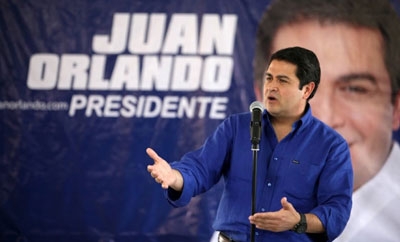Honduras’ new president-elect has vowed to enforce hardline security policies to combat drug trafficking and gang activity in the region’s most violent country, but his ability to deliver may be hampered by a weak political mandate after the election results were challenged.
Conservative National Party candidate Juan Orlando Hernandez was declared the winner of the Honduras presidential elections that took place on November 24, but leftist opposition groups refused to concede defeat amid accusations of electoral fraud, reported El Universal. The political tug-of-war has continued, despite the fact that the country’s electoral court made Hernandez’s victory official, reported the Associated Press.
One of the main platforms of Hernandez’s campaign has been his “mano dura” (iron fist) security policy, which he pledged to implement to attack rampant crime in the country, reported Milenio. As a congressman, Hernandez proposed the military police force that went into service in October, and his security plan includes giving even more power to the military to carry out law enforcement, reported Confidencial.
InSight Crime Analysis
The struggle for electoral legitimacy is just the first battle facing the new president in a country that has become increasingly ungovernable since a 2009 presidential coup, leading many to suggest it is sliding towards becoming a “narco-state.” As of October, the homicide rate so far in 2013 was 83 per 100,000 people, with the second-largest city, San Pedro Sula, ranked first and the capital, Tegucigalpa, fourth among the most violent cities in the world.
Efforts to address the country’s problems are hampered by endemic corruption among public officials, stuttering police reform and severe financial problems.
SEE ALSO: Honduras News and Profiles
While iron fist policies and the promise of firm action may rouse public sentiment, evidence suggests such strategies often increase violence. The move is likely to be the death knell of a stumbling effort to emulate the gang truce in neighboring El Salvador — the Barrio 18 and MS-13 gangs are the dominant street gangs in both countries — which itself could herald an uptick in violence.
Honduras’ move toward a mano dura policy could also be a sign of things to come in neighboring countries, particularly El Salvador, which is facing the prospect of its own gang truce crumbling, in the run up to elections in which the conservative candidate — a longstanding critic of the initiative — is leading the race.

